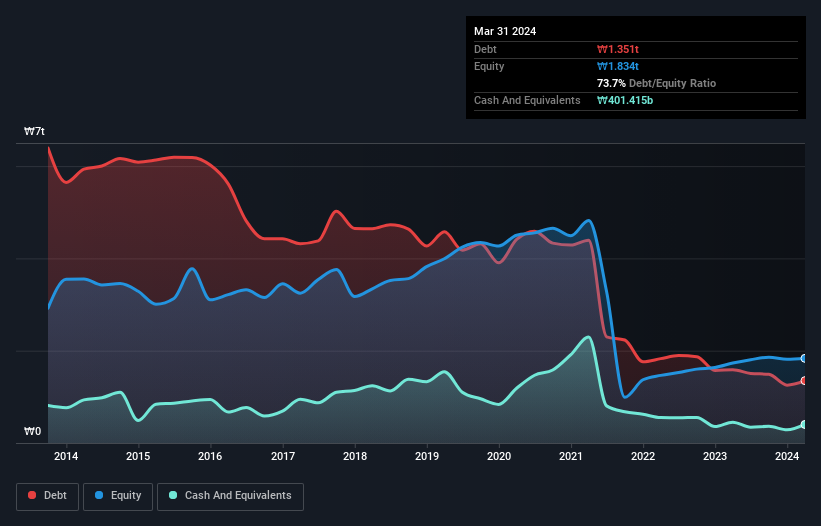- South Korea
- /
- Machinery
- /
- KOSE:A042670
Does HD Hyundai Infracore (KRX:042670) Have A Healthy Balance Sheet?

Legendary fund manager Li Lu (who Charlie Munger backed) once said, 'The biggest investment risk is not the volatility of prices, but whether you will suffer a permanent loss of capital.' When we think about how risky a company is, we always like to look at its use of debt, since debt overload can lead to ruin. We note that HD Hyundai Infracore Co., Ltd. (KRX:042670) does have debt on its balance sheet. But should shareholders be worried about its use of debt?
What Risk Does Debt Bring?
Debt is a tool to help businesses grow, but if a business is incapable of paying off its lenders, then it exists at their mercy. Ultimately, if the company can't fulfill its legal obligations to repay debt, shareholders could walk away with nothing. However, a more frequent (but still costly) occurrence is where a company must issue shares at bargain-basement prices, permanently diluting shareholders, just to shore up its balance sheet. Of course, plenty of companies use debt to fund growth, without any negative consequences. When we examine debt levels, we first consider both cash and debt levels, together.
View our latest analysis for HD Hyundai Infracore
What Is HD Hyundai Infracore's Net Debt?
As you can see below, HD Hyundai Infracore had ₩1.35t of debt at March 2024, down from ₩1.59t a year prior. However, it also had ₩401.4b in cash, and so its net debt is ₩949.9b.

A Look At HD Hyundai Infracore's Liabilities
Zooming in on the latest balance sheet data, we can see that HD Hyundai Infracore had liabilities of ₩1.92t due within 12 months and liabilities of ₩787.0b due beyond that. Offsetting this, it had ₩401.4b in cash and ₩1.11t in receivables that were due within 12 months. So it has liabilities totalling ₩1.20t more than its cash and near-term receivables, combined.
This deficit is considerable relative to its market capitalization of ₩1.68t, so it does suggest shareholders should keep an eye on HD Hyundai Infracore's use of debt. Should its lenders demand that it shore up the balance sheet, shareholders would likely face severe dilution.
In order to size up a company's debt relative to its earnings, we calculate its net debt divided by its earnings before interest, tax, depreciation, and amortization (EBITDA) and its earnings before interest and tax (EBIT) divided by its interest expense (its interest cover). This way, we consider both the absolute quantum of the debt, as well as the interest rates paid on it.
HD Hyundai Infracore's net debt is sitting at a very reasonable 1.8 times its EBITDA, while its EBIT covered its interest expense just 6.4 times last year. While that doesn't worry us too much, it does suggest the interest payments are somewhat of a burden. Sadly, HD Hyundai Infracore's EBIT actually dropped 4.7% in the last year. If earnings continue on that decline then managing that debt will be difficult like delivering hot soup on a unicycle. The balance sheet is clearly the area to focus on when you are analysing debt. But it is future earnings, more than anything, that will determine HD Hyundai Infracore's ability to maintain a healthy balance sheet going forward. So if you're focused on the future you can check out this free report showing analyst profit forecasts.
Finally, a company can only pay off debt with cold hard cash, not accounting profits. So it's worth checking how much of that EBIT is backed by free cash flow. Over the last three years, HD Hyundai Infracore barely recorded positive free cash flow, in total. Some might say that's a concern, when it comes considering how easily it would be for it to down debt.
Our View
Mulling over HD Hyundai Infracore's attempt at converting EBIT to free cash flow, we're certainly not enthusiastic. Having said that, its ability to cover its interest expense with its EBIT isn't such a worry. Looking at the balance sheet and taking into account all these factors, we do believe that debt is making HD Hyundai Infracore stock a bit risky. That's not necessarily a bad thing, but we'd generally feel more comfortable with less leverage. There's no doubt that we learn most about debt from the balance sheet. But ultimately, every company can contain risks that exist outside of the balance sheet. Case in point: We've spotted 2 warning signs for HD Hyundai Infracore you should be aware of.
At the end of the day, it's often better to focus on companies that are free from net debt. You can access our special list of such companies (all with a track record of profit growth). It's free.
Valuation is complex, but we're here to simplify it.
Discover if HD Hyundai Infracore might be undervalued or overvalued with our detailed analysis, featuring fair value estimates, potential risks, dividends, insider trades, and its financial condition.
Access Free AnalysisHave feedback on this article? Concerned about the content? Get in touch with us directly. Alternatively, email editorial-team (at) simplywallst.com.
This article by Simply Wall St is general in nature. We provide commentary based on historical data and analyst forecasts only using an unbiased methodology and our articles are not intended to be financial advice. It does not constitute a recommendation to buy or sell any stock, and does not take account of your objectives, or your financial situation. We aim to bring you long-term focused analysis driven by fundamental data. Note that our analysis may not factor in the latest price-sensitive company announcements or qualitative material. Simply Wall St has no position in any stocks mentioned.
Have feedback on this article? Concerned about the content? Get in touch with us directly. Alternatively, email editorial-team@simplywallst.com
About KOSE:A042670
HD Hyundai Infracore
Engages in the production and sale of construction equipment, engines, attachments, and utility equipment in South Korea and internationally.
Undervalued with excellent balance sheet.
Market Insights
Community Narratives



